Coffee beans are full of delicate oils and molecules that create each unique flavor. These molecules are easily damaged during the roasting process if a roaster is not careful.
The roasting process is a combination of science and taste. It requires a high level of knowledge of the equipment, the raw product and the roaster’s visual and tasting sensibility.
What is Artisan Roasting?
The process of artisan roasting coffee involves meticulously selecting the highest quality green beans and carefully controlling every step of the roasting process. Artisan roasters are experts at regulating the temperature of the bean as it is roasted, and they know how to balance the complex flavors of each batch.
Often, artisan roasters go beyond the factory presets on their equipment to add creativity and skill to the roasting process. The resulting coffee is smoother and more flavorful than a cup of commercially roasted beans.
Some artisan coffee growers even take control of the milling process, separating their harvest into micro-lots that each have distinct qualities. These unique characteristics help to distinguish the terroir that is the foundation of the flavor profile. In addition, artisan growers will sometimes plant different crops next to their coffee, which creates cross cropping that can further enhance the taste of the beans. This makes the artisan coffee beans unique and helps to ensure that it is of high quality.
How Does Artisan Roasting Affect the Taste of Coffee?
Unlike regular coffee, which is made without much consideration for the sourcing and roasting process, artisan coffee is designed as an experience from start to finish. Artisan roast coffee carefully choose the beans, then slowly and meticulously roast them to bring out their natural flavors.
They also take greater control of the milling process, classifying the coffee by micro-region and varietal. This separation helps to improve quality and highlight unique hints that can’t be replicated.
The beans used for artisan roasting are chock-full of delicate oils and molecules. These ingredients can be easily damaged during the roasting process, making it difficult to achieve a truly artisan-level product. Amateur methods or improper handling can cause scorching, overdevelopment, or underdevelopment of the beans, which will result in a less-than-pleasant cup of coffee. Thankfully, expert roasters understand the delicate nature of these ingredients and can prevent them from suffering any adverse effects. This helps ensure that the final brew is smooth, tangy, and tasty.
What Makes Artisan Roast Coffee So Unique?
Coffee beans are chock full of delicate oils and molecules that create each unique coffee flavor. These are sensitive and easily damaged by amateur methods, bad roasting, or even scorching. A dedicated artisan roaster understands the delicacy of the process and will take extra care to evenly heat and develop the beans during the roasting process to produce smooth, rich tasting coffee.
Artisan roasters are also more selective about their beans and source them from single-source farms around the world. This allows them to showcase the fantastic hints in each coffee. This is in stark contrast to the chain stores that often sell coffee sourced from multiple locations.
Some artisan roasters are also investing in micro mills to allow them to “design” their coffee, classifying it by region and varietal (coffee plant). This improves the quality of the bean and brings out the specific nuances that artisan coffee lovers appreciate. This is in stark contrast to the chain store approach that focuses on speed and lack of precision/ attention to detail.
How Can Artisan Roasting Help Me?
Artisan roasting is a great way to bring out the unique flavors of each coffee bean. The beans are roasted in small batches, and the roaster pays close attention to each batch to ensure that the beans are roasted to perfection. This also helps to prevent over-roasting, which can alter the taste of the coffee.
Coffee beans are chock-full of delicate oils and molecules that create each coffee’s distinct flavor. Unfortunately, these delicate elements are easily damaged by amateur practices or mishandling during the roasting process. Scorching, underdevelopment, and overdevelopment are all common problems that can destroy a cup of coffee.
Artisan roasters are typically small, family-owned businesses that value quality over quantity. They often choose single-source coffee beans from around the world, which allow them to highlight the subtle nuances that are lost in coffee made with mixed-origin beans. The artisan roasters also work closely with their suppliers to make sure that the beans are grown and harvested using sustainable methods.




